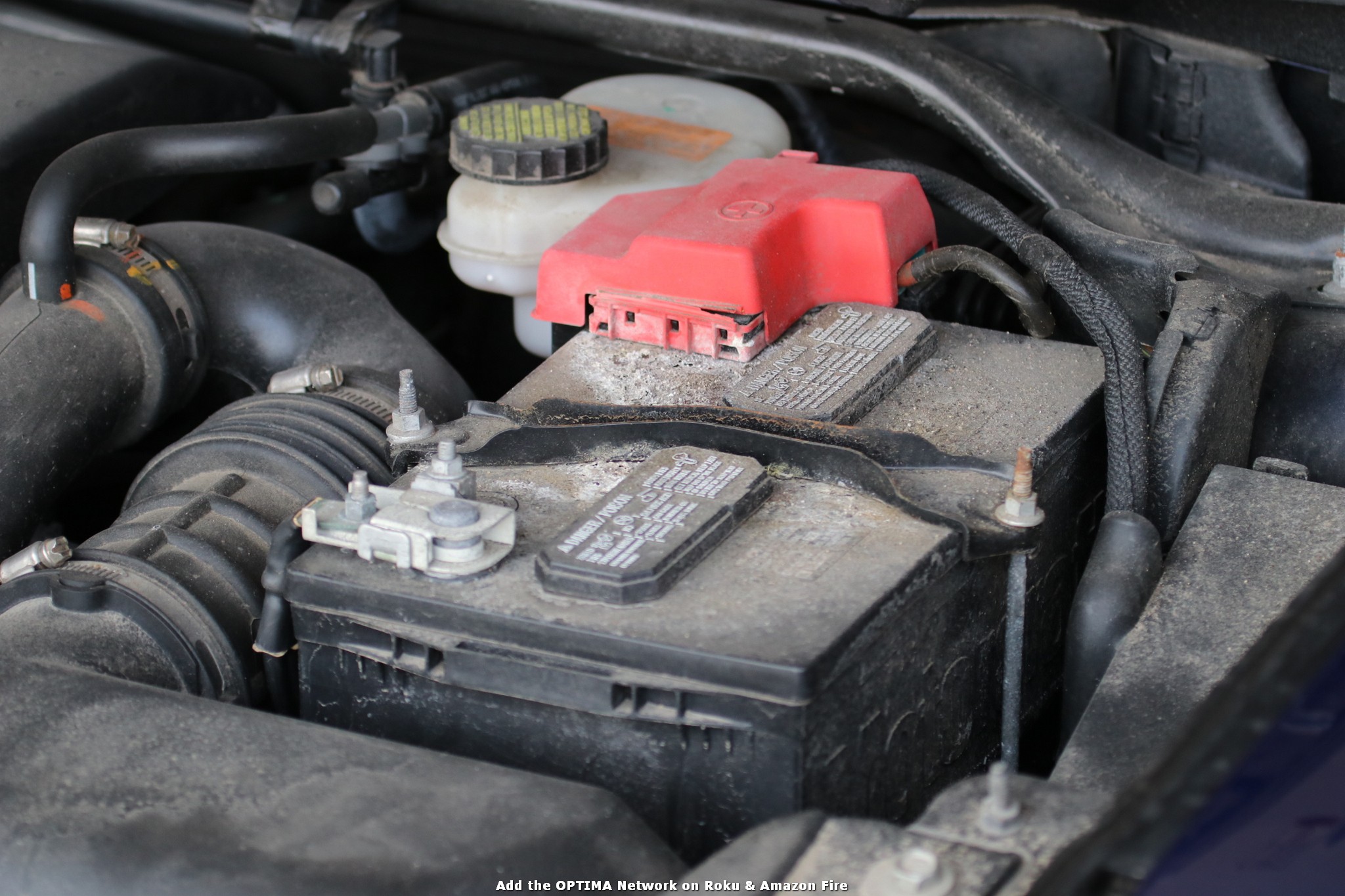What Causes Car Batteries to Fail Over Time?

Tips & Support
- Sponsor
- OPTIMA Batteries
- Location
- Rhine, WI


Age
Car batteries are consumable items with finite lifespans. It doesn't matter what kind of lead-acid car battery you have, whether it is flooded or AGM, flat plate or SPIRALCELL, all of these batteries begin moving toward their ultimate end, as soon as they roll off the production line. The older a car battery is, the more likely it is to fail. Once your battery hits five years old, it's probably a good idea to have it load-tested at least once a year. Most auto parts stores and battery retailers will offer this service free of charge. With that in mind, we'll cover off on some of the other most-common reasons car batteries fail over time.
Usage
In many instances, the more you use a car battery, especially if you are cycling it deeply, the sooner it will fail. That may seem like a no-brainer, but we don't want to miss out on even the most obvious reasons a car battery might fail over time. We also want to highlight what we mentioned about cycling a battery deeply and what exactly that means. Peukert's Law basically states that the more deeply you discharge your car battery, the fewer times you'll be able to discharge it.
To give you an example, Jan & Pam are twin sisters, who both own the exact same model of minivan. Jan commutes 20 miles on the highway to work each day, while Pam is a stay-at-home mom, who makes a lot of short trips around town to run kids to soccer games, ballet practice and school. Because Jan's drives are at highway speed for a sustained amount of time, the charging system in her van is able to properly-maintain voltage in her battery. Because Pam's drives are often less than 10 minutes and her kids watch a lot of videos in the parking lot, while waiting for siblings to get done with practices, Pam's battery gets deeply-discharged AND her van's charging system doesn't have enough time to replace the energy that was used to power the video monitor.
The battery in Jan's van may last five to ten years, because starting her van twice a day and giving it enough time to replace the energy keeps her battery voltage properly-maintained. The same battery in Pam's van may need to be replaced every couple years, because of how often it is deep-cycled. If Pam lives in a hot climate, like Phoenix or Miami, that could further shorten the lifespan of her battery.
Sulfation
Another reason car batteries will fail over time, is because they will sulfate. This most-commonly occurs from non-use. Most lead-acid batteries are fully-charged at about 12.6 volts. Whenever any lead-acid battery gets discharged below 12.4 volts and is left sitting in that state, sulfation begins forming in the battery, which diminishes both capacity and lifespan. That makes regular use of a battery maintainer an excellent idea for any vehicle that doesn't get driven on a daily basis.
Car batteries are more vulnerable to damage in extreme climates, both hot and cold. If your battery is discharged and in an extremely cold environment, it could be vulnerable to freezing, which could potentially ruin the battery. While extremely hot temperatures will also damage batteries, that damage often doesn't manifest itself until the weather turns cold and a battery has to work harder to start your engine.
How to Maximize Car Battery Lifespan
As we indicated earlier, proper voltage maintenance is the key to maximizing both battery performance and lifespan. If you drive a car regularly, there's a good chance you are maintaining proper voltage in your car battery. If your car doesn't see regular use or it sees the type of use that can lead to a deeply-discharged car battery, you'll want to do what you can to maintain proper voltage in your battery.
OPTIMA offers a full line of battery chargers and maintainers, that all do a great job of keeping your car battery fully-charged. Even in daily-driven vehicles, we recommend connecting your car battery to a quality battery charger overnight at least once a month, just to make sure your voltage is being properly-maintained. If you find it is usually at least 12.6 volts, you can expand that interval, but if you find your battery voltage is low, you may need to increase the frequency of that maintenance charging.
Car batteries are consumable items with finite lifespans. It doesn't matter what kind of lead-acid car battery you have, whether it is flooded or AGM, flat plate or SPIRALCELL, all of these batteries begin moving toward their ultimate end, as soon as they roll off the production line. The older a car battery is, the more likely it is to fail. Once your battery hits five years old, it's probably a good idea to have it load-tested at least once a year. Most auto parts stores and battery retailers will offer this service free of charge. With that in mind, we'll cover off on some of the other most-common reasons car batteries fail over time.
Usage
In many instances, the more you use a car battery, especially if you are cycling it deeply, the sooner it will fail. That may seem like a no-brainer, but we don't want to miss out on even the most obvious reasons a car battery might fail over time. We also want to highlight what we mentioned about cycling a battery deeply and what exactly that means. Peukert's Law basically states that the more deeply you discharge your car battery, the fewer times you'll be able to discharge it.
To give you an example, Jan & Pam are twin sisters, who both own the exact same model of minivan. Jan commutes 20 miles on the highway to work each day, while Pam is a stay-at-home mom, who makes a lot of short trips around town to run kids to soccer games, ballet practice and school. Because Jan's drives are at highway speed for a sustained amount of time, the charging system in her van is able to properly-maintain voltage in her battery. Because Pam's drives are often less than 10 minutes and her kids watch a lot of videos in the parking lot, while waiting for siblings to get done with practices, Pam's battery gets deeply-discharged AND her van's charging system doesn't have enough time to replace the energy that was used to power the video monitor.
The battery in Jan's van may last five to ten years, because starting her van twice a day and giving it enough time to replace the energy keeps her battery voltage properly-maintained. The same battery in Pam's van may need to be replaced every couple years, because of how often it is deep-cycled. If Pam lives in a hot climate, like Phoenix or Miami, that could further shorten the lifespan of her battery.
Sulfation
Another reason car batteries will fail over time, is because they will sulfate. This most-commonly occurs from non-use. Most lead-acid batteries are fully-charged at about 12.6 volts. Whenever any lead-acid battery gets discharged below 12.4 volts and is left sitting in that state, sulfation begins forming in the battery, which diminishes both capacity and lifespan. That makes regular use of a battery maintainer an excellent idea for any vehicle that doesn't get driven on a daily basis.
Car batteries are more vulnerable to damage in extreme climates, both hot and cold. If your battery is discharged and in an extremely cold environment, it could be vulnerable to freezing, which could potentially ruin the battery. While extremely hot temperatures will also damage batteries, that damage often doesn't manifest itself until the weather turns cold and a battery has to work harder to start your engine.
How to Maximize Car Battery Lifespan
As we indicated earlier, proper voltage maintenance is the key to maximizing both battery performance and lifespan. If you drive a car regularly, there's a good chance you are maintaining proper voltage in your car battery. If your car doesn't see regular use or it sees the type of use that can lead to a deeply-discharged car battery, you'll want to do what you can to maintain proper voltage in your battery.
OPTIMA offers a full line of battery chargers and maintainers, that all do a great job of keeping your car battery fully-charged. Even in daily-driven vehicles, we recommend connecting your car battery to a quality battery charger overnight at least once a month, just to make sure your voltage is being properly-maintained. If you find it is usually at least 12.6 volts, you can expand that interval, but if you find your battery voltage is low, you may need to increase the frequency of that maintenance charging.
